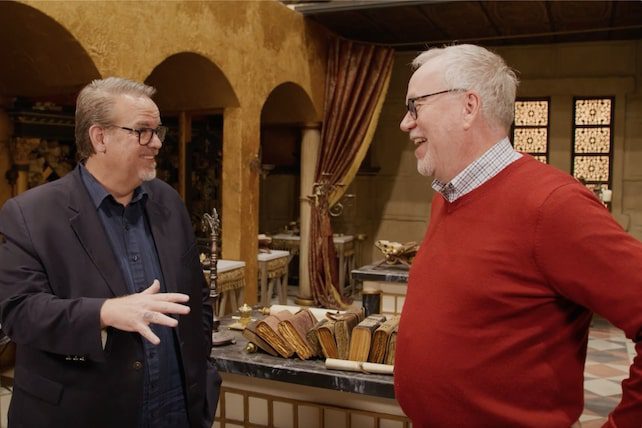“The Chosen” is not adding to Scripture but is a work of art meant to capture people’s imaginations and point them to the Bible, says Dr. Doug Huffman, a professor and a theological advisor on the show. Huffman joined Dr. Ed Stetzer on the set of “The Chosen” for an exclusive interview ahead of the show’s release in theaters today.
When people express concerns to him that “The Chosen” is “blasphemous” or “adding to the Bible,” said Huffman, “I have to remind them: This is not the Bible. This is a TV show. It’s a work of art.”
RELATED: Voddie Baucham Believes Watching ‘The Chosen’ Would Violate the Second Commandment
Huffman is professor of New Testament at the Talbot School of Theology at Biola University. During the interview with Stetzer, who is dean of the Talbot School of Theology, Huffman described his role as advisor and gave insight into how the show’s content is developed with an eye to both accuracy and relatability.
Doug Huffman: ‘The Chosen’ Aims To Be Faithful, Plausible and Relatable
Dr. Doug Huffman is one of three theological advisors who give input on the content of “The Chosen,” the popular TV series based on the life of Jesus Christ. The other two advisors are Father David Guffey, a Roman Catholic priest, and Messianic rabbi Jason Sobel.
Huffman explained that as a consultant on “The Chosen,” he and his fellow advisors see the show’s scripts ahead of time and offer feedback to the writing team based on the advisors’ areas of expertise. After the episodes are filmed, the three advisors watch the show with creator Dallas Jenkins and give additional feedback.
The professor said that his role is to give advice and that he does not make final decisions regarding what goes into the episodes. He does, however, participate in the biblical roundtables available for every episode, in which the three advisors and Jenkins discuss the episodes after they are filmed.
Huffman emphasized that the purpose of “The Chosen” is to encourage people to read the Bible, not to be a substitute for it. Jenkins’ hope is that people will “read the gospels with a proper sense of imagination,” said Huffman. “I think that’s one of the problems in the world today. We’re too familiar with the Bible…we’ve forgotten how to read it the way that it was intended to be read.” Instead, there is a tendency for people to see scriptural accounts as “flat Bible stories.”
“I mean that people have forgotten that these are not two-dimensional characters,” Huffman elaborated. “They are three-dimensional people. They had concerns.”

